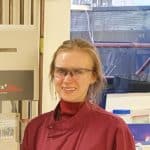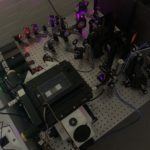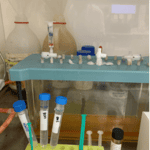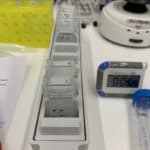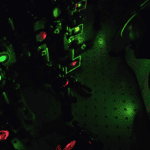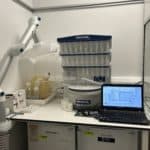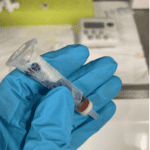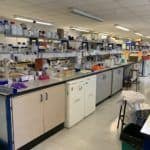Profile
Zuzanna Konieczna
-
About Me:
I’m a chemist, researcher & a theatre lover.
-
Read more
I’m a final year PhD student at the University of Edinburgh. I look at how we can use chemistry to learn about the proteins in the brain. I make fluorescent probes and look at them under microscopes.
I’m originally from Poland, and I first moved to Edinburgh for my undergraduate degree. I have enjoyed the lovely (although very windy) city, and decided to stay on for a PhD.
I was always involved with a local drama group throughout my education (university included), and am a big theatre lover. I couldn’t name a favourite play (there is just too many!), but I love going to see National Theatre Live plays in the cinema and discovering new plays during the Edinburgh Festival in August.
I’m also an experimental baker. I like making vegan cakes with unexpected ingredients like vinegar or tomatoes. I love house plants, and am on a mission to turn my flat into a jungle.
-
My pronouns are:
she/her
-
My Work:
I work on molecules and techniques that would let us see what goes wrong with proteins in the human brain, and how that can lead to diseases such as Alzheimer’s or Parkinson’s.
-
Read more
Alzheimer’s, Parkinson’s and dementia are all diseases of the brain, where people slowly lose their memory and sometimes control over their movements. In those diseases, a protein in the human brain start acting up. Instead of playing its normal role, the protein molecules start to “clump” together. This “clumping” makes the protein not functional, but is also harmful for the brain cells. In the “sticky” state the protein can attach to other things, and disrupt the normal functioning of the cell.
My work is trying to help understand what these protein “clumps” look like, what their features are, and how they can be formed within human brain. This is necessary to effectively diagnose and treat conditions like Alzheimer’s & Parkinson’s.
So how can we look at protein in the brain?
I am working on developing molecular labels that would be able to bind to the mis-behaving protein and show us where it is. I need to make sure the labels only bind to the protein I am interested in (as you can imagine, there is plenty other protein in the brain) and are able to detect the protein even in small(ish) amounts. The labels are very colourful and are “activated” by lasers. If I shine some light on them, they will also shine (fluoresce) a different colour – telling me that I found something interesting!
I test these labels under a special microscope (that I have helped build – I’ve never imagined I’d be using a screwdriver and a wrench as chemist before!). The microscope can gather a lot of data – it can show me a close up of a brain, and how bright the labelled protein is. It also records any changes in the colour of the label upon binding to the protein, and how the label becomes dimmer and dimmer over time (the fancy name for this property is “fluorescence lifetime”). This in turn, can help me reason about the structure of the protein “clump” – is it dense? Is it the same throughout the clump, or are the edges/centre a bit different?
It’s a chemistry project that requires biology and a bit of physics, which means I get to meet and work with a lot of experts from different fields.
-
My Typical Day:
I start my day off in the lab, running experiments. I’ll be either making molecules or playing with a microscope to test them. I get to look at brains from a close-up, and record some measurements to see how well my molecules have done. My afternoons often involve lots of head scratching, as I try to describe what I have seen, what it means, and how we can further improve on it!
-
Read more
As a scientist working in research, the most typical thing about my day is that I run experiments and analyse the data… usually to then plan some more experiments. What the experiments actually look like is a different story. This will change depending on the stage of the project, the question you are trying to answer, recent findings, opportunities for collaborations, and things/instruments available.
I work on molecules and techniques that can help us observe protein mis-behaviour, and actually have a couple of different laboratories for the different experiments I run. I synthesise molecules in a chemistry lab, but if I am testing molecules, I will usually be either in the “wet lab” (where we prepare samples, make solutions, work with brain tissue etc), or the optics lab (which is home to a couple of different microscopes that can collect all sorts of data).
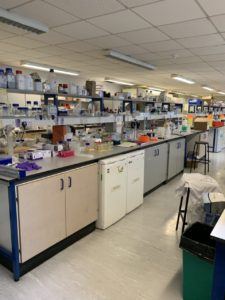
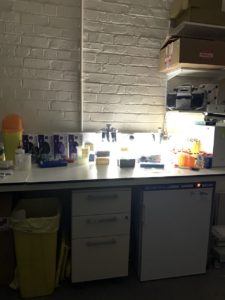
The instrument that I use, Freddie (technical name FLIM – Fluorescence Lifetime Imaging Microscope), is quite new! In fact there is only one other microscope like this (also at our university). It’s special because it lets me collect more information than any other instrument. It can see how bright the molecular labels I make are, but also can detect if they change colour when they bind to the protein I want to label. The microscope is also able to record “fluorescence lifetime” (how long it takes for the bright label to become dimmer over time). The more information I can get the better, because it helps me piece together what could be going on.
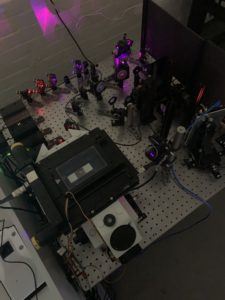
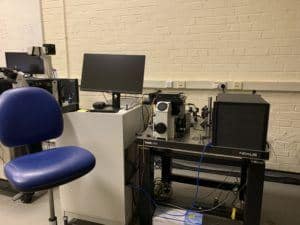
Once I am done running experiments, I am bound to spend some time on my laptop for the last bit of the afternoon – it’s important to take time to look over your results, make some pretty graphs, make sure you made the correct compound. It also helps planning the work for the next day: figuring out what information you are missing, what you can improve on, and what are the logical next steps.
-
Education:
Primary & secondary schools in Swarzedz, Poland. 1349 IB World School, Poznan, Poland. University of Edinburgh, UK.
-
Qualifications:
I went to primary and secondary school in Poland. I didn’t have GCSEs, but had to write three general exams (a social science one, a math & natural science one, and a foreign language one). These have helped me to get into a high school that did IB (International Baccalaureate). That meant I could mix and match my subjects to fit my interests (otherwise I would have had to stick to a “social” or “natural” sciences route) and I got to go to a school that had a big Hogwarts-like staircase.
International Baccalaureate Diploma – 1349 IB World School, Poznan, Poland. During my high school years I realised I like the practical aspects of science, and getting an IB diploma meant I could study abroad! This was a big dream of mine when I was a teenager.
MChem Medicinal and Biological Chemistry, University of Edinburgh. Throughout my university experience I realised I love experimenting, I got to move for a year and experience working in industry (and life in the north of England!) and it got me my current job.
-
Work History:
I’ve had some really cool (non-science related) jobs such as a voice actor, hostel receptionist and a support worker.
I’ve completed an industrial placement for my master’s degree, working as a Process Development Chemist at AstraZeneca, Macclesfield.
-
Current Job:
PhD student in the Chemistry Department. Although technically a student (still plenty of things to learn!), I am part of the research staff, get to teach and demonstrate experiments in undergraduate labs.
-
Employer:
University of Edinburgh
-
My Interview
-
How would you describe yourself in 3 words?
brain dye designer
What did you want to be after you left school?
I thought about becoming a vet or a translator.
Were you ever in trouble at school?
Possibly...
If you weren't doing this job, what would you choose instead?
I would like to work in a theatre (either on stage or behind the scenes), or maybe try science book translation? I can also see myself working in care.
Who is your favourite singer or band?
ABBA & The Beatles. I like listening to the radio in the lab, but am also a big fan of classical music and beautiful operatic voices.
What's your favourite food?
Hummus! Also Polish dumplings.
If you had 3 wishes for yourself what would they be? - be honest!
A pet bunny, more sunshine in Scotland and to visit the Cairngorm Reindeer Centre.
Tell us a joke.
Why should you go to a chemist for all your problems? Because they have a solution!
-



